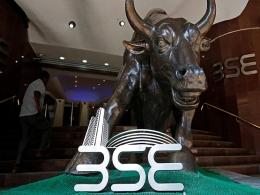Indian debt traders have dismissed government officials' concerns about bonds being mispriced, saying they reflected fundamentals but the central bank was behind the curve, and urged steps to fight inflation at Thursday's policy meeting.
While high global crude prices, tightening in other markets and potential rate increases by the U.S. Fed weigh on sentiment, investors turned more bearish on Indian bonds after the government unveiled a record market borrowing plan last week.
The benchmark 10-year bond yield spiked to a 2-1/2-year high after the government announced a borrowing target of 14.95 trillion rupees ($199.84 billion) for the next fiscal year.
That was nearly 2 trillion rupees more than markets had expected would be needed to fund the government's 'growth budget' at a time when the economy looks set for sustained recovery.
"With the government well and truly accepting the mantle of reviving growth, the RBI no longer needs to prioritise growth over inflation," said Arvind Chari, chief investment officer at Quantum Advisors.
"Their current stance of 'accommodative policy for as long as necessary to revive growth' needs to be changed."
He was among six senior traders in major bond trading institutions who told Reuters of a need for the central bank to change its focus to fight inflation.
Some senior government officials agreed, as they feared the central bank was focusing too much on reviving growth at the expense of its core inflation mandate, and risked being pressured to raise rates more aggressively in future.
"The government will focus on growth and the monetary policy committee should take care of inflation now," said one official, who declined to be identified because of the sensitivity of the topic.
There was no immediate comment from the central bank.
The bank's monetary policy committee (MPC) has held the key repo rate at record lows since May 2020, reiterating that it would remain supportive of growth and keep its stance accommodative until economic recovery was firmly entrenched.
However, market participants believe it is time for the RBI to shift focus back to controlling inflation and at least change its stance to 'neutral' from 'accommodative' at the upcoming review.
Retail inflation accelerated to a five-month high of 5.59% in December from a year earlier, while wholesale price-based inflation, a proxy for producer prices, marginally eased to 13.56%, but has stayed in double digits for nine months.
YIELDS SPIKE
Officials said last week's sharp rise in yields took them by surprise, fuelling concern about the surge in borrowing costs.
The move indicated the market was "ill informed", said one senior finance ministry official, adding that current yield levels were "unacceptable".
In a rare move, the government cancelled its 240-billion-rupee bond auction set for Feb. 11 after a review of its cash balance.
Finance ministry officials said the cancellation was also a signal that the government was not comfortable with yield levels and was willing to "take on the market" to defuse trading based on "speculation".
The central bank has forced auction underwriters to buy papers and even cancelled individual bonds at auctions in recent weeks to avoid the very high yield cut-offs sought.
Some foreign investors said they were reluctant to buy Indian bonds at current levels as the RBI was unwilling to recognise the looming inflation problem.
"The RBI is still calling up market participants and asking what we want. We don't want anything more than a fair price," said a senior trader, who sought anonymity as conversations with the RBI are meant to be kept private.
"Markets are not over-reacting, markets are trading on fundamentals. If the RBI and finance ministry think we are being unfair, then they should take concrete action to show us how we are wrong."
Traders said the central bank was buying bonds on its books last year when the market was bidding at levels uncomfortable for the RBI and should continue to do so if it did not want to accept the higher yields at auctions.
Another trader, who did not want to be identified, confirmed the RBI had made calls as late as last week to urge purchases of bonds at market levels, but said he was not keen and stayed away.
"This level of yield is not enough value to justify buying Indian bonds," he said, adding that the RBI's growth focus was "far from reality" by contrast with other key economies.







